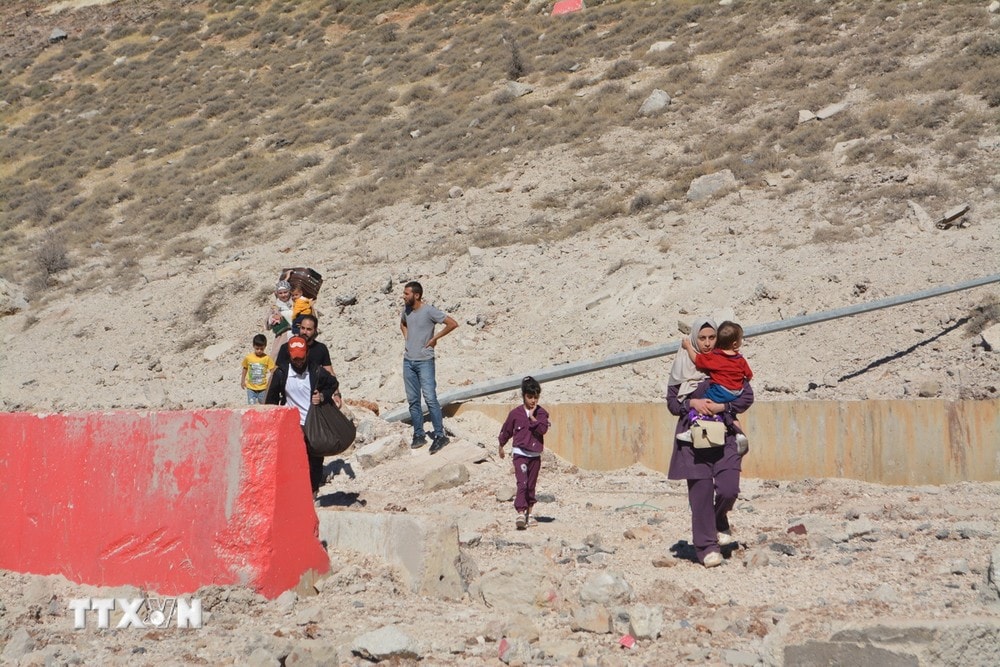Since the outbreak of hostilities between Hezbollah and Israel, there have been 36 attacks on health care facilities in Lebanon, forcing at least 96 centers to shut down.

The United Nations Office for the Coordination of Humanitarian Affairs (OCHA) on October 7 expressed concern over the rapidly deteriorating humanitarian situation in Lebanon as the conflict continues to escalate between Israel and Hezbollah forces in Lebanon.
According to OCHA, since the outbreak of hostilities between Hezbollah and Israel from October 8, 2023 to October 4, 2024, there have been 36 attacks on healthcare infrastructure in Lebanon, forcing at least 96 primary healthcare centers to cease operations.
The attacks also killed 77 World Health Organization (WHO) health workers. Many civilian infrastructures were also damaged, including at least 25 water supply facilities, affecting the lives of more than 300,000 people.
Meanwhile, the Israeli army has issued a series of evacuation notices for residents in the south and southern suburbs of the capital Beirut. Figures from the International Organization for Migration show that more than 540,000 people have been forced to flee since the fighting began.
At a press conference on October 7, Mr. Stephane Dujarric - spokesman for UN Secretary-General Antonio Guterres - said Ms. Jeannine Hennis-Plasschaert, UN Special Coordinator in Lebanon, is continuing to cooperate closely with all relevant parties.
Mr. Stephane Dujarric called for an immediate ceasefire and to facilitate the implementation of diplomatic measures.
Meanwhile, the situation on the ground in the border area between Israel and Lebanon is still heating up. Hezbollah launched a series of rockets into central Israel on the night of October 7 local time.
The Israeli military said five rockets were fired from a location in Lebanon, about 100km from the border with Israel. Air raid sirens sounded around Tel Aviv as some of the rockets landed in uninhabited areas, while others were intercepted.
Hezbollah said the missiles hit the Glilot base of the Israeli military's intelligence unit 8200 on the outskirts of Tel Aviv. The statement also stated that Hezbollah is always ready to defend Lebanon and its people.
Israel has announced that it is taking further steps in its limited ground offensive in Lebanon, which was announced on October 1. The Israeli military has designated four more northern towns near the Lebanese border as “closed military zones” and has banned all movement into them since 10 p.m. local time on October 7. The four towns are Rosh HaNikra, Shlomi, Hanita and Arab al-Aramshe.
The announcement came after Israeli military spokesman Avichai Adraee asked Lebanese residents to evacuate the coastal area between the Awali River north of the city of Sidon and the Israeli town of Rosh HaNikra.
Faced with the worsening security situation since Israel launched a fierce attack on Lebanon on September 23, countries continue to speed up the evacuation of their citizens from Lebanon.
On October 7, Jordan evacuated 44 more citizens from Lebanon on a military flight. On social network X, Jordanian Deputy Prime Minister and Foreign Minister Ayman Safadi called for an immediate ceasefire in Lebanon as well as in the Gaza Strip and the West Bank.
Meanwhile, Air France and low-cost carrier Transavia, a subsidiary of Air France, said they would suspend flights to Tel-Aviv until October 15 and Beirut until October 26 due to security concerns.
According to the announcement of Air France-KLM group, the owner of the two airlines, the resumption of flight operations will depend on the assessment of the actual situation.
In a statement issued on October 7, the US called on Israel not to attack Beirut International Airport and the roads leading to the airport.
US State Department spokesman Matthew Miller stressed the importance of keeping Beirut airport and access routes open to ensure US and other foreign citizens can safely leave Lebanon.
TH (according to VNA)